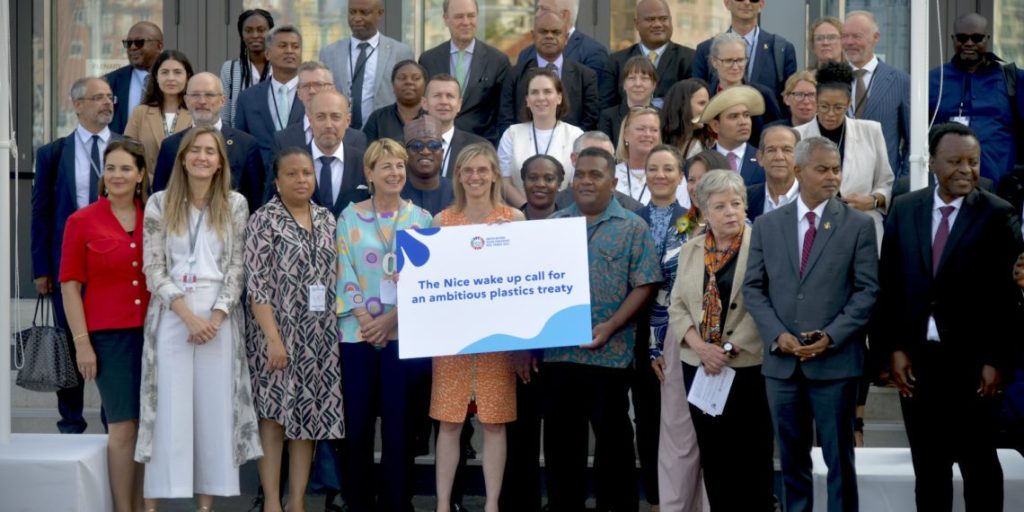Minister Clarke Presents the Small Island States Alliance (SISA) as a Model for a Global Plastics Treaty at UNOC25
The 3rd United Nations Ocean Conference (UNOC) in Nice, France, witnessed a pivotal moment in the global fight against plastic pollution. Ninety-five nations, including St. Kitts and Nevis, rallied behind “The Nice Wake Up Call,” a landmark declaration advocating for a robust and ambitious global plastics treaty. This treaty recognizes the interconnectedness of plastic pollution with the climate crisis and biodiversity loss, issues that disproportionately impact vulnerable nations, particularly Small Island Developing States (SIDS). St. Kitts and Nevis, represented by Hon. Dr. Joyelle Clarke, Minister of Sustainable Development, Environment and Climate Action, played a prominent role, amplifying the voice of Caribbean SIDS on the global stage.
Minister Clarke’s address underscored the urgency of the situation for SIDS, highlighting their limited capacity to respond to these complex, intersecting crises. She emphasized that for these nations, tackling plastic pollution isn’t just an environmental issue; it’s a matter of survival, intertwined with economic stability and the very future of their communities. She outlined three key priorities for SIDS in the treaty negotiations, beginning with the regulation and management of single-use plastics, a policy already enacted in St. Kitts and Nevis under its Sustainable Island State Agenda (SISA). This decisive action, she argued, demonstrates not just environmental ambition but a crucial political commitment to safeguarding their future.
The second priority highlighted by Minister Clarke was the need for a treaty that addresses the entire lifecycle of plastics, from production and consumption to waste management. This comprehensive approach echoes the principles enshrined in UNEA Resolution 5/14, which calls for a holistic and binding global framework. By considering the entire plastic lifecycle, the treaty aims to prevent pollution at its source, reduce consumption of unnecessary plastics, and promote sustainable waste management practices, ultimately minimizing the environmental impact of plastic waste.
The third, and perhaps most crucial, priority emphasized by Minister Clarke was the establishment of dedicated financial mechanisms to support SIDS in their efforts to combat plastic pollution. She powerfully articulated the inherent injustice of expecting small, vulnerable economies to bear the brunt of a problem largely created by others. She called for remediation and financial assistance, recognizing that these small island nations cannot shoulder the financial burden alone. This call for financial support resonates with the principle of common but differentiated responsibilities, acknowledging the varying capacities and contributions of different nations to the plastic pollution crisis.
“The Nice Wake Up Call” itself outlines five key pillars for the treaty: reduction in the production and consumption of primary plastic polymers, phasing out problematic plastic products, improved product design to enhance recyclability and reduce waste, robust implementation and financing mechanisms, and a dynamic, enforceable structure adaptable to evolving scientific evidence. These pillars provide a comprehensive framework for addressing the multifaceted challenge of plastic pollution, from reducing production at the source to ensuring effective implementation and financial support. The final negotiations for the treaty are scheduled to conclude at INC-5.2 in Geneva in August, building upon the momentum generated in Nice.
The proactive stance and forward-thinking policies of St. Kitts and Nevis, exemplified by its SISA framework, are gaining recognition as a potential model for other nations. SISA, which focuses on sustainable development and environmental protection, positions St. Kitts and Nevis as a leader in the fight against plastic pollution. The Federation’s early action and commitment to sustainable practices provide a valuable example for other countries seeking to address the plastic crisis effectively. By championing these principles on the global stage, St. Kitts and Nevis is contributing significantly to the shaping of a historic treaty aimed at eradicating plastic pollution, preserving fragile ecosystems, and ensuring a sustainable future for generations to come. The treaty represents a crucial step towards a world free from the scourge of plastic waste, protecting both human health and the environment.
Share this content:












Post Comment